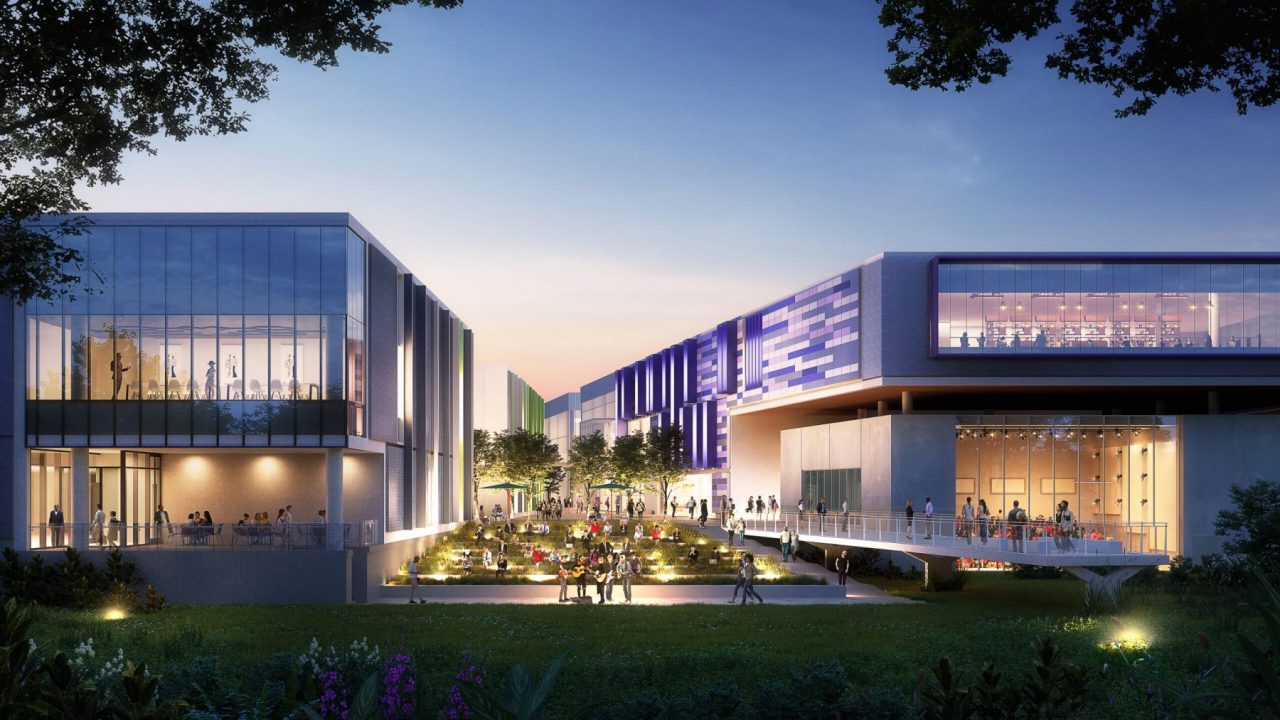When faculty and staff returned to campus in Fall 2021, they found that TCC Northwest as they remembered it was no more. Redevelopment that began while the College was closed drastically changed the footprint of the campus. For many, this meant a complete displacement of their offices and the need to adapt to a new location.
No one felt this change more than Student Services. Financial Aid, Business Services, the Police Department and the Registrar, formerly housed in the now-demolished WADM building, relocated to the former common room of WSTU 1303.
Business Services was the first group to transition. Working out of WTLO during the campus shutdown allowed the team to more efficiently clear their offices, Business Services Manager Lynn Heisey said. Heisey’s team was the first to begin the relocation process in January 2021. In their case, the pandemic shutdown made it easier to sort through all of the items that needed moving. Heisey also credits the campus administration for helping things move smoothly.
“We worked a few Saturdays as a team, and then I worked many additional hours, sorting through items and determining what needed to be sent to records storage, shredded or simply trashed,” Heisey said. “Honestly, I don’t know how we would have managed working out of our office while purging and packing.”
Heisey reported that students have not seemed to have any trouble locating them and that the centralized group of Financial Aid, Admissions and Records and Business Services has made things easier for students who have overlapping concerns or issues involving multiple offices.
The new, shared office space has had its challenges — private offices for managers, shared file storage, a small, shared break room with a portable sink — but Heisey said there have been some advantages, too.
“I actually have enjoyed being seated amongst my team-members, being able to hear what’s happening and readily available to answer questions, offer suggestions, etc.,” she said. “I’ve always had an ‘open door policy’ and have been available, but now I have no door, so I feel like I am more approachable.”
Registrar Samantha Taylor said the move has had some unexpected benefits for her team, as well.
“Having our three areas sharing space has required us to coordinate,” she said. “I think it’s promoted interdepartmental conversations and allowed our staff to learn more about what the other areas do. We are planning a holiday party together and doing a Secret Santa, so we’re getting to know one another, which is fun!”
Altogether, the change has promoted a collaborative work environment.
“I think that having the whole team sitting together has promoted training conversations and allowed us to stay on the same page when it comes to the way we do our work,” Taylor added. “We have several new teams members and being together makes us all more accessible to one another when there is a question.”
For Jane Suresh-Kumar, administrative assistant to the vice president for academic affairs, the move from WADM to WSTU’s second floor has been an opportunity to improve workflow procedures and build a stronger bond with her fellow administrative assistants, who now share the same space.
“Honestly, over the past several years I have been working towards downsizing,” Suresh-Kumar said. “I had moved our office to an electronic database and re-thinking how we could work more efficiently. In addition, working from home during COVID helped me rethink my workflow and procedures. I still love my paper, but I’ve just learned to use less!”
Faculty members, too, have been affected by the move. Those whose offices were previously in WADM were moved elsewhere on the campus. Some departments, like Computer Science, were housed almost entirely in WADM.
Four faculty members in the computer science department were moved to shared office spaces in WACB 1129A in a preview of the open-office concept that is part of the plans for the finished TCC Northwest. Adjusting to the shared space has presented some challenges, said Paul Koester, instructor of computer science.
Koester said that the group has had to adapt to sharing the space during Teams meetings or while helping students. Because the room is behind a locked door, it has also discouraged students from visiting during office hours.
Steve Smiley, instructor of information technology, said the team is working on solutions for this, including propping up the doors and investing in good headphones. Smiley said that, for him, there have been some unintended benefits of the move.
“We are each more aware of each other’s schedules and what decisions we are making for the individual classes that we teach,” Smiley said. He added that there is “more communication, but also more chances to see how our individual approaches may have drifted away from each other over the years.”
Assistant professor of computer science John Kidd agreed.
“IT has always been collegial,” he said. “Without walls we collaborate/talk more than before.”

